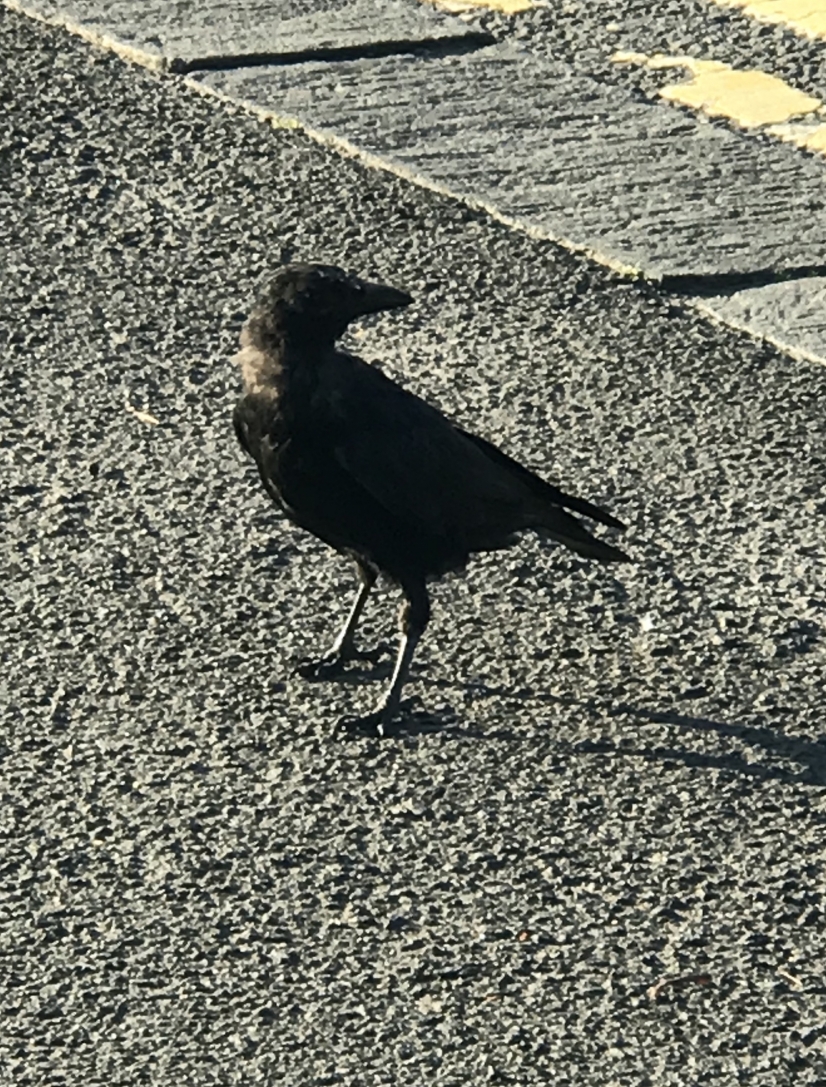On Sunday I used as the basis for reflection three Bible passages - all fairly well known - that refer to ravens. I was especially struck by the text in Luke 12 that parallels almost exactly one on Matthew 6. The key difference that Matthew's Jesus tells his readers to 'look at the birds of the air' en masse, whilst Luke's explicitly says, 'consider the ravens.' This isn't that, it's typed up fresh this morning, but it expresses pretty much the same thoughts
Ravens are carrion birds, throughout history and in assorted cultures (including Greek, Roman, Celtic, Islamic, Jewish and first nation North American) viewed with, at best, suspicion and, more typically, seen as harbingers of doom. They are 'unclean' - not suitable for eating (at least before Jesus declared all things clean, but I have never come across roast raven on a menu...). They are viewed with disdain, and in some thinking they become 'vice' to the dove's 'virtue' (one reading to the flood story in Exodus 8).
The Hebrew word for raven smiply means 'black' a name also used for the bedouin people whose distinctive black clothing and nomadic lifestyle seemed to reflect something of these birds. Outsiders, treated with suspicion, prejudicially seen as bad or even evil... And Jesus said, 'consider the ravens...'
I was really struck, as I reflected on this reading, of the association of 'black' with bad/evil dating back to the poor raven who flew out of the ark and didn't think to bring Noah the gift of a twig. We are not told it never came back, all we know is it flew around until it found somewhere to land. It isn't judged within the text, but tradition has judged it, and not kindly.
And because we tend to think of lovely white doves as peaceful (when they may equally have been grey pigeons) we can unconsciously slide into a 'white = good, black = bad' dualism that, taken to extreme, affects our view of skin tones and races. Remember, the Bedouins were Arabic or Semitic, the 'black' referred to their clothes - and possibly their hair colour - not their skin tone.
If Jesus tells me to 'consider the ravens' then he tells me to look at my own prejudices, at who (or what) I view with suspicion or disdain based on some unacknowledged or unrecognised perception. Who are the outcasts, the strangers, that God loves and cares for, and from whom I can learn?
The story of Elijah being fed by ravens (1 Kings 17) is one I have loved since Sunday school. I loved imagining big black birds swooping down carrying baskets in their beaks (that would be very tricky for a raven!) and delivering yummy food to a tired, frightened prophet. I can't say I ever stopped to think how terrifying it might be to have birds swoop down on you!
A couple of decades ago, I learned the truth of the usage of the Hebrew word - for the bird and for the Bedouin, and began to entertain the possibility that rather than birds swooping down, it might have been Bedouins bringing gifts of food and water to Elijah. Demythologising the story could have destroyed it, but it didn't, I was struck by the wonder of this nomadic people seeing someone in need and making sure he had food and water for as long as he needed it. It's actually no less miraculous, and possibly more in keeping with stories about widows baking bread. Above all, it seems to hint at a story Jesus told about a despised foreigner helping an injured man. Consider the ravens.
I am left to reflect on who I might identify as a 'raven' and how that might affect my living.
It's not just that ravens don't grow crops or store things on barns - that's true for all birds - but they are, somwhow, the least loved of birds, not suitable to eat, not fit for ritual sacrifice, not trainable for service - and God takes care of their needs. Consider the ravens...

Comments
Great sermon, Good story. I have to confess I like all the black birds which is not surprising since where I live I am surrounded by them. Also I have always liked their Scottish (perhaps North of England) name of, corbies. There is a sinister little poem which mentions them beside a customer wall and a dead/dying man...which made me shiver. On the subject of ancient bias with black/white. Surely that doesn't apply to areas of the world where the prevailing colour until a couple of centuries ago was brown? Similarly with the corresponding mythologies about crows/ravens. Would that not be more associated with Death in their being cartoon birds? Finally, black/white, could it simply be the fear of dark night against the light day? You see, Catriona you make us think. Thank you.